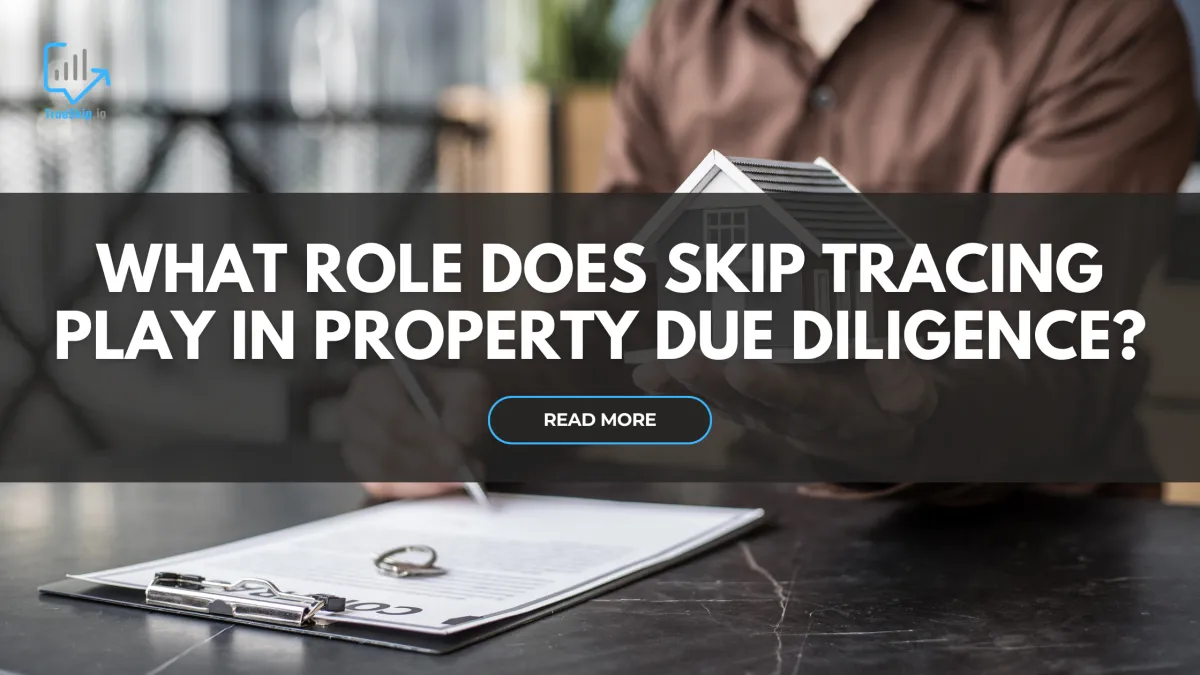
True Skip Blogs
The most Affordable & Comprehensive Data in the Industry.
.05 Cent Skip Tracing!!


What Role Does Skip Tracing Play In Property Due Diligence?
Introduction
Property due diligence is an essential step before making any investment. Skip tracing, a powerful tool in the real estate professional's arsenal, plays a crucial role in this process. In this guide, we will explore the significance of skip tracing in property due diligence, shedding light on its benefits, methods, and ethical considerations.

Understanding Property Due Diligence
Property due diligence is a critical and thorough examination of a property's legal, financial, and physical characteristics conducted before any real estate transaction or investment. This meticulous process is essential for mitigating risks and ensuring that the investment aligns with your objectives.
One fundamental aspect of property due diligence is the examination of property records. This involves a comprehensive review of documents such as titles, deeds, and surveys to confirm ownership and verify property boundaries. Any discrepancies or issues discovered during this phase can be addressed before they become costly problems.
Additionally, property due diligence aims to identify any liens or encumbrances on the property. Liens can include outstanding debts or legal claims that could impact the property's transfer of ownership. By uncovering these potential obstacles early on, you can negotiate with the seller or take necessary steps to resolve them.
Zoning laws and regulations also play a crucial role in property due diligence. Ensuring that the property complies with zoning requirements is essential for its intended use. Violations or non-compliance issues can lead to delays, fines, or even prevent you from pursuing your planned investment strategy.
In summary, property due diligence is a meticulous and systematic investigation that safeguards your investment by uncovering any hidden risks or obstacles associated with a property. It encompasses a thorough examination of property records, identification of liens or encumbrances, and verification of compliance with zoning laws. This process empowers you with the knowledge needed to make informed decisions and mitigate potential challenges, ultimately contributing to the success of your real estate investment.
The Role of Skip Tracing
Skip tracing is the process of locating individuals or property-related information. In property due diligence, skip tracing comes into play when you need to gather critical data about property owners, lienholders, or any other parties associated with the property. Here's how skip tracing contributes to a successful due diligence process:
1. Locating Property Owners
One of the primary objectives of skip tracing is to find property owners, even if they are unresponsive or difficult to locate. This is crucial for verifying ownership and establishing contact for negotiations or legal matters.
2. Identifying Liens and Encumbrances
Skip tracing helps uncover hidden liens, judgments, or other encumbrances on a property. These findings are essential for evaluating a property's financial health and potential legal complications.
3. Assessing Property History
Through skip tracing, you can delve into a property's history, including past owners, transactions, and any legal disputes. This historical context is invaluable for making informed investment decisions.
4. Verifying Seller Information
When purchasing a property, you need accurate and up-to-date information about the seller. Skip tracing ensures that you are dealing with legitimate and authorized parties in the transaction.
Methods of Skip Tracing in Property Due Diligence
Skip tracing, a vital component of property due diligence, encompasses various methods for locating property-related information and property owners. This process is crucial for real estate investors, allowing them to gather comprehensive data, verify property ownership, and assess potential risks and opportunities. Below, we explore some essential methods of skip tracing used in property due diligence.
Public Records:
Accessing public records is a fundamental skip tracing method. It involves examining property tax records, deeds, and other publicly available documents to ascertain property ownership, assess liens, and identify any legal issues associated with the property.
Online Databases:
Skip tracers frequently utilize online databases and search engines to gather information. These databases can provide details about property owners, their contact information, and any history of property transactions.
Social Media and Internet Research:
Investigating social media profiles and online presence can yield valuable insights. Property owners may share information about their properties, providing investors with leads for potential acquisitions.
Utility and Service Records:
Examining utility bills and service records, such as water, electricity, or cable bills, can help identify property occupants and potentially reach property owners directly.
Neighborhood Canvasing:
Skip tracers may physically visit a property's neighborhood to gather information from neighbors or tenants. This method can provide firsthand accounts of property ownership and condition.
Professional Skip Tracing Services:
Many real estate professionals opt to enlist skip tracing services that specialize in property due diligence. These services leverage advanced technology and databases to provide comprehensive property-related data.
Legal Notices and Filings:
Searching for legal notices and filings, such as foreclosure notices or bankruptcy filings, can uncover valuable information about a property's status and ownership.
Reverse Address Lookup:
Using reverse address lookup tools, skip tracers can identify property owners by entering an address. This method can be particularly useful when the property owner's contact information is unknown.
Real Estate Agents and Title Companies:
Collaborating with local real estate agents and title companies can provide access to their networks and databases, facilitating property owner identification.
Public Records Requests:
In some cases, skip tracers may submit public records requests to government agencies or municipalities to obtain property-related information.
Ethical Considerations in Skip Tracing
While skip tracing is an indispensable tool, it must be employed with ethical considerations in mind. Property professionals must adhere to legal and ethical standards, respecting individuals' privacy rights and ensuring the responsible use of gathered information.
Respecting Privacy Rights:
Ethical skip tracing involves respecting the privacy rights of individuals whose information is being sought. It is crucial to strike a balance between the need to access certain data and an individual's right to privacy. Property professionals should ensure that their skip tracing activities do not intrude upon an individual's personal space or violate privacy laws.
Compliance with Laws:
Ethical skip tracing necessitates strict compliance with all relevant laws and regulations. Property professionals should be well-versed in laws such as the Fair Credit Reporting Act (FCRA) and data protection regulations. Adhering to these legal frameworks ensures that skip tracing activities are conducted within the bounds of the law.
Responsible Use of Information:
Ethical practitioners understand that skip tracing is a means to an end, not an end in itself. The information obtained through skip tracing should be used responsibly and for legitimate purposes. It should not be misused for harassment, fraud, or any unlawful activities.
Transparency:
Ethical skip tracing professionals maintain transparency in their activities. When contacting individuals or property owners, they should identify themselves, explain the purpose of their inquiry, and provide clear and accurate information.
Data Security:
Protecting the data gathered during skip tracing is paramount. Property professionals must ensure the security of this sensitive information, guarding against breaches and unauthorized access.
Empathy and Sensitivity: Ethical skip tracing involves approaching property owners or individuals with empathy and understanding, particularly in cases of distressed homeowners or sensitive situations. Offering solutions and assistance rather than exacerbating problems is a hallmark of ethical skip tracing.
In conclusion, skip tracing plays an indispensable role in property due diligence, offering real estate professionals the means to gather critical information, verify property ownership, and assess potential risks. However, it is essential to conduct skip tracing with the utmost respect for ethical standards, privacy rights, and legal compliance. By balancing the power of skip tracing with ethical conduct, real estate practitioners can navigate the due diligence process successfully, making informed investment decisions that lead to positive outcomes.
Real estate investment is a complex endeavor that requires careful consideration and thorough research. Skip tracing serves as a valuable tool in this process, enabling investors to access crucial data that may not be readily available through conventional means. Whether you're looking to identify property owners, verify ownership details, or uncover potential liens or judgments, skip tracing can provide the insights needed to assess the property's suitability for investment.
However, it's important to recognize that skip tracing is a powerful tool that should be used responsibly and ethically. It's not a shortcut to bypass legal and ethical considerations. Real estate professionals must ensure they comply with all relevant regulations, such as the Fair Credit Reporting Act (FCRA), and respect individuals' privacy rights during the skip tracing process.
Moreover, ethical conduct in skip tracing involves approaching property owners or related individuals with empathy and understanding. While distressed properties may present investment opportunities, it's crucial to offer solutions rather than exacerbate their problems. Ethical engagement fosters positive relationships and can lead to mutually beneficial outcomes.
In summary, skip tracing is a valuable asset in property due diligence, but it should always be employed with a commitment to ethical standards, legal compliance, and respect for individuals' privacy. By maintaining this balance, real estate professionals can harness the power of skip tracing to make informed investment decisions and contribute positively to the real estate industry. Ultimately, ethical skip tracing ensures that property due diligence serves the interests of all parties involved, leading to successful and responsible real estate investments.
FAQ's
What is your data like?
At TrueSkip.io, we provide premium quality data. Our commitment to excellence ensures that our skip tracing information is accurate, reliable, and up-to-date. We prioritize data integrity to deliver the highest level of quality to our customers.
How long does is take to get data back?
We understand the importance of timely information. Our typical turnaround time is 24 business hours or less. We strive to process and deliver your requested data as quickly as possible, enabling you to move forward with your projects promptly and efficiently.
How much does it cost?
We offer tiered pricing based on the amount of data you need. Our pricing structure is designed to be flexible and affordable, accommodating projects of all sizes. You only pay for the records you require, ensuring cost-effectiveness without sacrificing quality.
What about a list with missing phone numbers?
At TrueSkip.io, we charge per record rather than per hit. While we strive to provide as much data as possible, it's important to note that the availability of phone numbers can vary depending on the sources and information provided. Our pricing model ensures fair and transparent billing based on the records you submit for processing.
Don't settle for subpar data or overpriced solutions. TrueSkip.io is here to revolutionize the way you approach skip tracing. Experience the power of high-quality data that doesn't drain your resources. Join the ranks of countless satisfied customers who have embraced TrueSkip.io as their go-to provider for accurate, reliable, and cost-effective skip tracing data.

Navigation
About us
Get In Touch
© Copyright 2024. Trueskip.io. All rights reserved.
